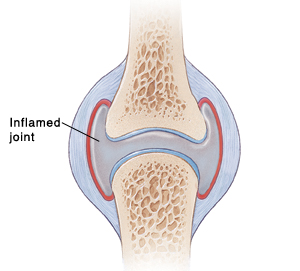Gout is an inflammation of a joint caused by an inflammatory response to gout crystals in the joint fluid. This occurs when there is excess uric acid. Uric acid is a normal waste product in the body. It builds up in the body when the kidneys can't filter enough of it from the blood. This may occur with age and kidney disease. Gout occurs more often in men than women with obesity, diabetes, high blood pressure, or high levels of fats in the blood. It may run in families. Gout tends to come and go. A flare up of gout is called an attack. Certain medicines, drinking alcohol, or eating certain foods (such as shellfish or foods with additives such as high-fructose corn syrup) may increase uric acid levels in the blood and cause a gout attack. It is most common in the big toe or other joints of the feet.
During a gout attack, the affected joint may become hot, red, swollen, and painful. If you have had 1 attack of gout, you are likely to have another. An attack of gout can be treated with medicine. If these attacks become frequent, a daily medicine may be prescribed to help the kidneys remove uric acid from the body.
Home care
During a gout attack:
-
Contact your health care provider for advice and therapy choices at the early stages of a gout flare. Treating the flare right away can prevent it from getting worse. Your provider can prescribe medicine to improve pain and shorten your gout flare.
-
Rest painful joints. If gout affects the joints of your foot or leg, you may want to use crutches for the first few days to keep from bearing weight on the affected joint.
-
When sitting or lying down, raise the painful joint to a level higher than your heart.
-
Apply an ice pack (ice cubes in a plastic bag wrapped in a thin towel) over the injured area for 20 minutes every 1 to 2 hours the first day for pain relief. Continue this 3 to 4 times a day for swelling and pain.
-
Stay away from alcohol and foods listed below (see Preventing attacks) during a gout attack. Drink extra fluid to help flush the uric acid through your kidneys.
-
If you were prescribed a medicine to treat gout, take it as your provider has instructed. Don't skip doses.
-
Take anti-inflammatory medicine as directed by your provider. If you have chronic liver or kidney disease, take blood thinners, or ever had a stomach ulcer or digestive tract bleeding, talk with your provider before using these medicines.
-
If pain medicines have been prescribed, take them exactly as directed.
Preventing attacks
-
Limit or stop alcohol use. Excess alcohol intake can cause a gout attack.
-
Limit these foods and drinks:
-
Organ meats, such as kidneys and liver
-
Certain seafoods (anchovies, sardines, shrimp, scallops, herring, mackerel)
-
Wild game, meat extracts, and meat gravies
-
Foods and drinks sweetened with high-fructose corn syrup, such as sodas
-
-
Eat a healthy diet that includes low-fat and nonfat dairy, whole grains, and vegetables.
-
If you are overweight, talk to your health care provider about a weight reduction plan. Stay away from fasting or extreme low calorie diets (less than 900 calories per day). This will increase uric acid levels in the body.
-
If you have diabetes or high blood pressure, work with your provider to manage these conditions.
-
Protect the joint from injury. Wear good-fitting socks and shoes. Injury can set off a gout attack.
-
Follow up with your provider to determine if you would benefit from daily medicine to prevent gout flares.
Follow-up care
Follow up with your health care provider or as advised.
When to get medical advice
Call your health care provider if you have:
-
Fever over 100.4°F (38.ºC) with joint pain that is getting worse.
-
Increasing redness around the joint.
-
Pain developing in another joint.
-
Repeated vomiting, abdominal pain, or small amounts of blood in the vomit or stool (black or red color).
Call 911
Call
-
Large amounts of blood in the vomit or stool (black or red color)
-
Fainting


